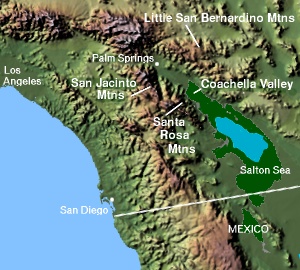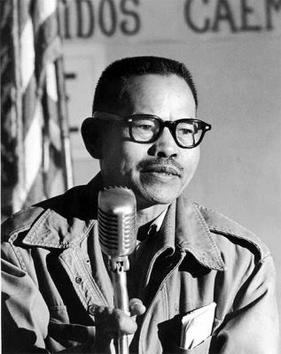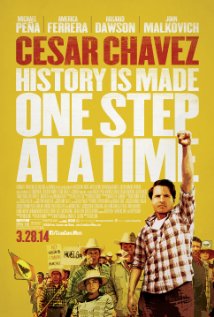Related Research Articles

Cesar Chavez was an American labor leader and civil rights activist. Along with Dolores Huerta, he co-founded the National Farm Workers Association (NFWA), which later merged with the Agricultural Workers Organizing Committee (AWOC) to become the United Farm Workers (UFW) labor union. Ideologically, his worldview combined leftist politics with Catholic social teachings.

Coachella is a city in Riverside County, California, United States. It is the namesake and easternmost city of the Coachella Valley, in Southern California's Colorado Desert.

Indio is a city in Riverside County, California, United States, in the Coachella Valley of Southern California's Colorado Desert region. It lies 23 miles (37 km) east of Palm Springs, 75 miles (121 km) east of Riverside, 127 miles (204 km) east of Los Angeles, 148 miles (238 km) northeast of San Diego, 250 miles (400 km) west of Phoenix, and 102 miles (164 km) north of Mexicali, Mexico.

The United Farm Workers of America, or more commonly just United Farm Workers (UFW), is a labor union for farmworkers in the United States. It originated from the merger of two workers' rights organizations, the Agricultural Workers Organizing Committee (AWOC) led by organizer Larry Itliong, and the National Farm Workers Association (NFWA) led by César Chávez and Dolores Huerta. They became allied and transformed from workers' rights organizations into a union as a result of a series of strikes in 1965, when the mostly Filipino farmworkers of the AWOC in Delano, California, initiated a grape strike, and the NFWA went on strike in support. As a result of the commonality in goals and methods, the NFWA and the AWOC formed the United Farm Workers Organizing Committee on August 22, 1966. This organization was accepted into the AFL–CIO in 1972 and changed its name to the United Farm Workers Union.

The Coachella Valley is an arid rift valley in the Colorado Desert of Southern California in Riverside County. The valley may also be referred to as Greater Palm Springs and the Palm Springs Area due to the prominence of the city of Palm Springs and disagreement over the name Coachella. The valley extends approximately 45 mi (72 km) southeast from the San Gorgonio Pass to the northern shore of the Salton Sea and the neighboring Imperial Valley, and is approximately 15 mi (24 km) wide along most of its length. It is bounded on the northeast by the San Bernardino and Little San Bernardino Mountains, and on the southwest by the San Jacinto and Santa Rosa Mountains.

Colegio Cesar Chavez was an American college-without-walls in Mount Angel, Oregon. The college was named after Mexican American civil rights activist César Chávez. Colegio was established in 1973 and closed in 1983. Colegio was the first accredited, independent four-year Chicano/Latino college in the United States. In 1975 it was granted candidacy status from the Northwest Association of Schools and Colleges. In 1977, Colegio granted degrees to 22 graduates, a number exceeding the combined number of Chicanos who graduated that same year from University of Oregon and Oregon State University. In his book Colegio Cesar Chavez, 1973–1983: A Chicano Struggle for Educational Self-Determination, author Carlos Maldonado writes that Colegio Cesar Chavez was one of the few institutions that was named after Cesar Chavez during his lifetime.

Dolores Clara Fernández Huerta is an American labor leader and civil rights activist who, with Cesar Chavez, is a co-founder of the United Farmworkers Association, which later merged with the Agricultural Workers Organizing Committee to become the United Farm Workers (UFW). Huerta helped organize the Delano grape strike in 1965 in California and was the lead negotiator in the workers' contract that was created after the strike.

Raul Ruiz is an American physician and politician serving as the U.S. representative for California's 25th congressional district. He is a member of the Democratic Party.

The Delano grape strike was a labor strike organized by the Agricultural Workers Organizing Committee (AWOC), a predominantly Filipino and AFL-CIO-sponsored labor organization, against table grape growers in Delano, California to fight against the exploitation of farm workers. The strike began on September 8, 1965, and one week later, the predominantly Mexican National Farmworkers Association (NFWA) joined the cause. In August 1966, the AWOC and the NFWA merged to create the United Farm Workers (UFW) Organizing Committee.

Eliseo Vasquez Medina is a Mexican-American labor union activist and leader, and advocate for immigration reform in the United States. From 1973 to 1978, he was a board member of the United Farm Workers. He is currently secretary-treasurer of the Service Employees International Union. He was previously an international executive vice president, the first Mexican American to serve on the union's executive board. Medina announced his resignation as an SEIU executive vice president effective October 1, 2013.

Cesar Chavez Day is a U.S. federal commemorative holiday, proclaimed by President Barack Obama in 2014. The holiday celebrates the birth and legacy of the civil rights and labor movement activist Cesar Chavez on March 31 every year.
Fred Ross was an American community organizer. He founded the Community Service Organization (CSO) in 1948, which, with the support of the Industrial Areas Foundation, organized Mexican Americans in California. The CSO in San Jose, CA gave a young Cesar Chavez his first training in organizing, which he would later use in founding the United Farm Workers. Ross also trained the young Dolores Huerta in community organizing.

The Salad Bowl strike was a series of strikes, mass pickets, boycotts and secondary boycotts that began on August 23, 1970 and led to the largest farm worker strike in U.S. history. The strike was led by the United Farm Workers against the International Brotherhood of Teamsters. The Salad Bowl strike was only in part a jurisdictional strike, for many of the actions taken during the event were not strikes. The strike led directly to the passage of the California Agricultural Labor Relations Act in 1975.
The California Agricultural Labor Relations Act (CALRA) is a landmark statute in United States labor law that was enacted by the state of California in 1975, establishing the right to collective bargaining for farmworkers in that state, a first in U.S. history.

Pineros y Campesinos Unidos del Noroeste, more commonly known by the acronym PCUN, is the largest Latino union in the U.S. state of Oregon. PCUN is located in Woodburn. According to the Statesman Journal, the meetings that led to the formation of PCUN were held at Colegio Cesar Chavez, the nation's first fully accredited and independent Latino college. PCUN was founded in 1977 by Cipriano Ferrel, who graduated from Colegio Cesar Chavez and worked closely with Cesar Chavez himself. Ferrel was motivated to create the organization after an increase in immigration raids in Oregon. PCUN has organized the creation of migrant housing and farmworker housing. Cipriano Ferrel worked closely with Cesar Chavez.

Richard Estrada Chavez was an American labor leader, organizer and activist. Chavez was the younger brother of labor leader César Chávez, who co-founded the National Farm Workers Association, now known as the United Farm Workers (UFW). Richard Chavez is credited with building the UFW into a major California agricultural and political organization.
Helen Fabela Chávez was an American labor activist for the United Farm Workers of America (UFWA). Aside from her affiliation with the UFW, she was a Chicana with a traditional upbringing and limited education. She was also the wife of César Chávez.

Modesto "Larry" Dulay Itliong, also known as "Seven Fingers", was an American labor organizer. He organized West Coast agricultural workers starting in the 1930s, and rose to national prominence in 1965, when he, Philip Vera Cruz, Benjamin Gines and Pete Velasco, walked off the farms of area table-grape growers, demanding wages equal to the federal minimum wage, that became known as the Delano grape strike. He has been described as "one of the fathers of the West Coast labor movement."

Cesar Chavez is a 2014 Mexican American biographical film produced and directed by Diego Luna about the life of American labor leader Cesar Chavez, who cofounded the United Farm Workers. The film stars Michael Peña as Chavez. John Malkovich co-stars as the owner of a large industrial grape farm who leads the opposition to Chavez's organizing efforts. It premiered in the Berlinale Special Galas section of the 64th Berlin International Film Festival.

A Mexican American is a resident of the United States who is of Mexican descent. Mexican American-related topics include the following:
References
- ↑ "Raul Loya". San Francisco Chronicle. 6 April 2015.
- ↑ Kristmann, Michelle (4 April 2005). "Alfredo Acosta Figueroa". Farm Worker Movement (1): 4.
- ↑ Day, Mark (1971). Forty acres: Cesar Chavez and the farm workers . Praeger. p. 63.
- ↑ Baumer, Julie (7 July 1969). "Education Conference Slated at P.D. School". The Desert Sun.
- ↑ "Loya Able To Retain Credentials". The Desert Sun. August 30, 1969. p. 5.
- ↑ "Longshoremen Support Loya". The Desert Sun. May 14, 1970.